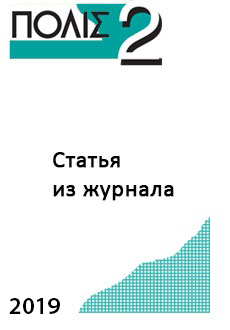Online shop of "Polis. Political Studies" Journal
We in the world, the world in us
Ryabchenko N.A., Malysheva O.P., Gnedash A.A. Presidential Campaign in Post-Truth Era: Innovative Digital Technologies of Political Content Management in Social Networks Politics. – Polis. Political Studies. 2019. No 2. P. 92-106 (In Russ.)
Free!
post-truth, post-truth politics, alternative facts, ‘filter bubble’, fake news, political content management, the Internet, social networks, types of users, linguistic discourse analysis, Donald J. Trump’s US Presidential Campaign.
Modern socio-political discourse on various layers of communication exploits the notions of posttruth, post-truth politics and fake news, which became topical in the wake of the Brexit referendum and US Presidential Campaign of 2016. These events, as well as many others, caused a shift in political science and exposed a need for the reconsideration of the impact of online space on the development of socio-political systems all over the world. Besides, these events exposed a research need for political content studies in the online space at micro and macro-levels. The online processes are omplex and non-linear, thus, require complex and hybrid analytical methods – for example, a combination of network analysis, mathematic analysis and linguistic and discourse analysis – the tools used by the authors of the article to study the political content produced during the Trump’s US Presidential Campaign 2016. The purpose of the research was to identify the peculiarities of political content production and the impact it could have on prospective voters (such as shaping public opinion, agitation and construction of a required expected behavior). The empirical foundation of the research is metadata of the social networks, required for a network analysis; likewise, the text corpus, a set of messages produced by D. Trump’s team during the US Presidential Campaign 2016 in the same social networks, was the empirical base for linguistic discourse analysis. The network analysis, which originates from the theory of complex networks, was applied to study of the process of political content consumption by online users (prospective and active voter groups), and in particular, how the production capacity of social network users, as regards the produced or spread political content, can determine their roles (the opinion leaders, the sensors, the implementers, the readers, the reputation players). The linguistic discourse analysis allowed to identify the key peculiarities of the researched political content, produced as a part of a successful marketing campaign (aimed at promoting a candidate for the presidency) in social networks and online space as a whole. The study of the Trump’s US Political Campaign 2016 revealed that the online dominance, acquired via social network marketing (which is a result of communicative strategies exploitation), can convert into a political dominance in the offline space.
 English
English Русский
Русский

Reviews
There are no reviews yet.